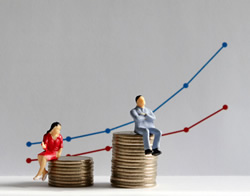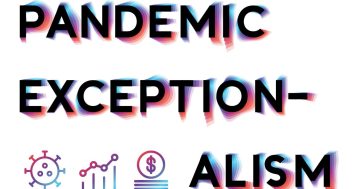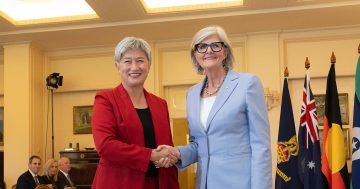Anu Madgavkar, Olivia White, Mekala Krishnan, Deepa Mahajan, and Xavier Azcue* say the continued economic fallout of the COVID-19 pandemic is having a negative effect on gender equality.
 As COVID-19 continues to affect lives and livelihoods around the world, we can already see that the pandemic and its economic fallout are having a regressive effect on gender equality.
As COVID-19 continues to affect lives and livelihoods around the world, we can already see that the pandemic and its economic fallout are having a regressive effect on gender equality.
By our calculation, women’s jobs are 1.8 times more vulnerable to this crisis than men’s jobs.
Women make up 39 per cent of global employment but account for 54 per cent of overall job losses.
One reason for this greater effect on women is that the virus is significantly increasing the burden of unpaid care, which is disproportionately carried by women.
This, among other factors, means that women’s employment is dropping faster than average, even accounting for the fact that women and men work in different sectors.
Given trends we have observed over the past few months, in a gender-regressive scenario in which no action is taken to counter these effects, we estimate that global GDP growth could be $1 trillion lower in 2030 than it would be if women’s unemployment simply tracked that of men in each sector.
It is important to note that the impact could be more severe than the one we have modelled here if factors such as increased childcare burdens, attitudinal bias, a slower recovery, or reduced public and private spending on services such as education or childcare make women leave the labour market permanently.
Conversely, taking action now to advance gender equality could be valuable, adding $13 trillion to global GDP in 2030 compared with the gender-regressive scenario.
A middle path—taking action only after the crisis has subsided rather than now—would reduce the potential opportunity by more than $5 trillion.
The cost of that delay amounts to three-fourths of the total global GDP we could potentially lose to COVID-19 this year.
These estimates build on the McKinsey Global Institute’s (MGI’s) Power of Parity work since 2015.
This research maps 15 gender-equality indicators across four categories: equality in work, essential services and enablers of economic opportunity, legal protection and political voice, and physical security and autonomy. (The latter three categories together indicate equality in society.)
Using a Gender Parity Score, or GPS, calculated using these indicators, MGI has established a strong link between gender equality in society and gender equality in work—and shown that the latter is not achievable without the former.
Even before the coronavirus, our 15 indicators showed that tangible progress toward gender parity had been uneven and that large gender gaps remained across the world.
Now, without intervention to address the disproportionate impact of COVID-19 on women, there’s a risk that progress could go into reverse.
This would not just set back the cause of gender equality but also hold back the global economy.
Conversely, taking steps to redress the balance now could improve social and economic outcomes for millions of women globally and help boost economic growth.
While most people’s lives and work have been negatively affected by the crisis, our analysis shows that, overall, women’s jobs and livelihoods are more vulnerable to the COVID-19 pandemic.
Our analysis finds that the gendered nature of work across industries explains one-fourth of the difference between job-loss rates for men and women.
The lack of systemic progress to resolve other societal barriers for women explains the rest.
The nature of work remains significantly gender specific: women and men tend to cluster in different occupations in both mature and emerging economies.
This, in turn, shapes the gender implications of the pandemic: our analysis shows that female jobs are 19 per cent more at risk than male ones simply because women are disproportionately represented in sectors negatively affected by the COVID-19 crisis.
What are other factors?
An important one is the burden of unpaid care, the demands of which have grown substantially during the pandemic.
Women are on the front lines here; they do an average of 75 per cent of the world’s total unpaid-care work, including childcare, caring for the elderly, cooking, and cleaning.
As COVID-19 has disproportionately increased the time women spend on family responsibilities it is not surprising that women have dropped out of the workforce at a higher rate than explained by labour-market dynamics alone.
Another factor could be COVID-19’s disproportionate impact on female entrepreneurship, including women-owned microenterprises in developing countries (where such enterprises account for a high share of female labour-force participation).
The crisis may have made some family resources scarce, such as financial capital to invest in businesses or digital devices that families must now share as children’s schooling has gone online.
Attitudes also shape how women experience the economic consequences of a crisis relative to men.
These aren’t new beliefs but rather traditional societal mindsets about the role of women.
They may be reflected in current decisions, at the organizational level or indeed within the family, about who gets to keep their jobs.
The evidence from our research is clear: what is good for greater gender equality is also good for the economy and society as a whole.
The COVID-19 pandemic puts that into stark relief and raises some critically important choices: act now to remove barriers to greater female labour-force participation and a bigger role in society and reap the economic and social benefits; delay and still benefit, but to a substantially lesser degree; or allow the disappointing status quo to prevail and slide backward, leaving massive economic opportunity on the table and negatively affecting the lives of millions of women.
Parity is powerful.
This is the time for policy makers and business leaders to step up and make it a reality.
*Anu Madgavkar is a partner with the McKinsey Global Institute. Mekala Krishnan is a senior fellow with McKinsey. Olivia White and Deepa Mahajan are McKinsey partners in the San Francisco office, and Xavier Azcue is a consultant in the New Jersey office.
This article first appeared at mckinsey.com











